2018初一下一般过去时讲解及 训练
人教版英语七年级下册--时态专讲一般过去式讲义+习题
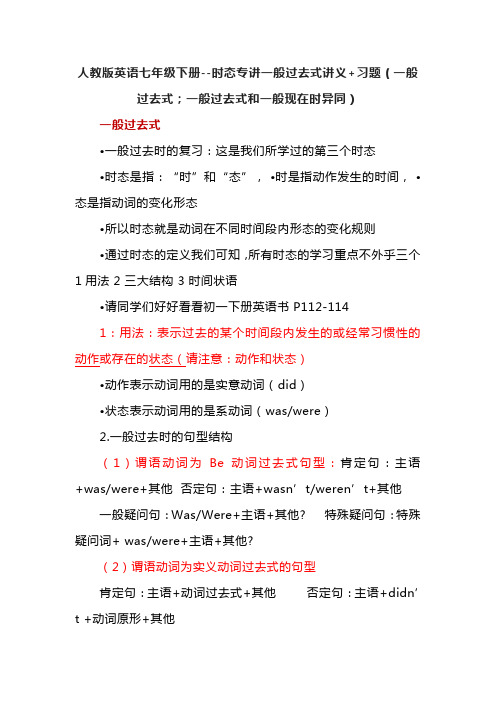
人教版英语七年级下册--时态专讲一般过去式讲义+习题(一般过去式;一般过去式和一般现在时异同)一般过去式•一般过去时的复习:这是我们所学过的第三个时态•时态是指:“时”和“态”,•时是指动作发生的时间,•态是指动词的变化形态•所以时态就是动词在不同时间段内形态的变化规则•通过时态的定义我们可知,所有时态的学习重点不外乎三个1用法 2 三大结构 3 时间状语•请同学们好好看看初一下册英语书P112-1141:用法:表示过去的某个时间段内发生的或经常习惯性的动作或存在的状态(请注意:动作和状态)•动作表示动词用的是实意动词(did)•状态表示动词用的是系动词(was/were)2.一般过去时的句型结构(1)谓语动词为Be动词过去式句型:肯定句:主语+was/were+其他否定句:主语+wasn’t/weren’t+其他一般疑问句:Was/Were+主语+其他? 特殊疑问句:特殊疑问词+ was/were+主语+其他?(2)谓语动词为实义动词过去式的句型肯定句:主语+动词过去式+其他否定句:主语+didn’t +动词原形+其他一般疑问句:Did+主语+动词原形+其他? 特殊疑问句:特殊疑问词+did+主语+动词原形+其他?这里面有两种情况4句话需要大家牢记,这4句话适用于所有时态第1种情况,当句子中含有实意动词时1含有实意动词的句子变否定句时找对应的助动词(do did does等)在助动词后加not,把实意动词还原为原型其他成分不变2含有实意动词的句子变一般疑问句找对应的助动词,把助动词提前大写,实意动词还原为原形,后面打问号第2种情况句子中含有系动词(am is are was were等)3当句子中含有系动词时,变否定句在系动词后加not即可4当剧中含有系动词时变一般疑问句把系动词提到句前大写,后面打问号一般过去式当中还涉及到动词变过去式形态的变化规则(+ed规则),它有两大类“1规则变化规则需牢记 2不规则变化(遇见一个记一个死记硬背)”这些规则希望同学们都熟记在心遇见动词变过去式可以熟练运用,此规则是初一下册语法重点可参照初一下册课本P114,不再赘述3.时间状语(标志词)yesterday, just now, in 1982, ago, last week(year, night, month…), at the age of 5, one day,once upon a time,that day等连用。
(完整版)初中一般过去时详细讲解与练习
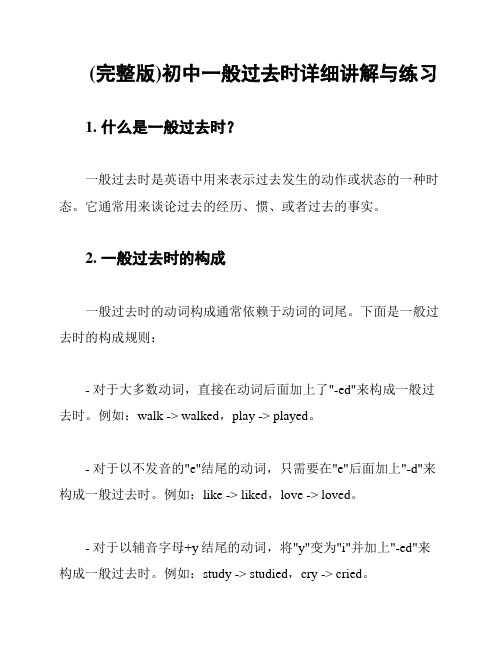
(完整版)初中一般过去时详细讲解与练习1. 什么是一般过去时?一般过去时是英语中用来表示过去发生的动作或状态的一种时态。
它通常用来谈论过去的经历、惯、或者过去的事实。
2. 一般过去时的构成一般过去时的动词构成通常依赖于动词的词尾。
下面是一般过去时的构成规则:- 对于大多数动词,直接在动词后面加上了"-ed"来构成一般过去时。
例如:walk -> walked,play -> played。
- 对于以不发音的"e"结尾的动词,只需要在"e"后面加上"-d"来构成一般过去时。
例如:like -> liked,love -> loved。
- 对于以辅音字母+y结尾的动词,将"y"变为"i"并加上"-ed"来构成一般过去时。
例如:study -> studied,cry -> cried。
- 部分动词的一般过去时需要进行不规则变化。
例如:go -> went,eat -> ate。
3. 一般过去时的用法一般过去时通常用来描述以下情况:- 过去发生的动作:I walked to school yesterday.- 过去的经历:He lived in London for five years.- 过去的事实:She was a teacher in the past.4. 一般过去时的句型练下面是一些练,帮助加深对一般过去时的理解和运用:1. 请用一般过去时填空:Yesterday, I ________ (watch) a movie at home.2. 完成句子:He _____ (visit) his grandparents last summer.3. 改写句子,使用一般过去时:I read a book yesterday. (改为否定句)4. 改写句子,使用一般过去时:They played basketball in the park. (改为疑问句)5. 总结一般过去时是用来表示过去发生的动作或状态的一种时态。
初一年级英语一般过去时详细讲解和练习

用括号里动词的适当形式填空.
1. He __re_a_d______ <read> that book last week.
arrived
2. Last nimgahrtrihede ___________ <arrive> just in time for the show. showed 3. Mary ___________ <marry> Thomas yesterday.
2. live 5. hope 8. finish 11. go 14.get 17.see 20.take
3. stop 6. trip 9. want 12.have 15e 18.put 21.read
答案
1. look looked 2. live lived 3. stop stopped
4. carry carried 5. hope hoped 6. trip tripped
7. call called 8. finish finished 9. want wanted
10.are were 11.go went 12.have had
13.do did 14.get got 15e came
句型构成 ①含有be动词的一般过去时 <单数was 复数were>
肯定句: 主语 + was / were+其他.
否定句: 主语 + was / were + not+其他. was not =wasn’t were not = weren’t
一般疑问句及其答语: was / were + 主语 +其他成分? Yes , 主语+ was / were. No ,主语+ wasn’t/ weren’t.
7下一般过去时讲解及训练
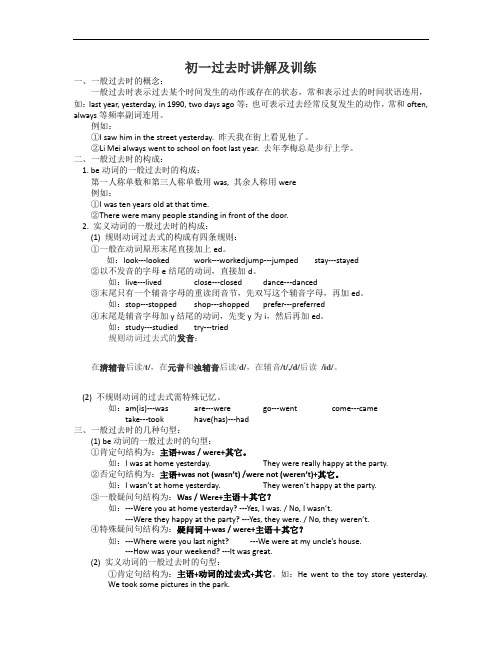
初一过去时讲解及训练一、一般过去时的概念:一般过去时表示过去某个时间发生的动作或存在的状态,常和表示过去的时间状语连用,如:last year, yesterday, in 1990, two days ago等;也可表示过去经常反复发生的动作,常和often, always等频率副词连用。
例如:①I saw him in the street yesterday. 昨天我在街上看见他了。
②Li Mei always went to school on foot last year. 去年李梅总是步行上学。
二、一般过去时的构成:1. be动词的一般过去时的构成:第一人称单数和第三人称单数用was, 其余人称用were例如:①I was ten years old at that time.②There were many people standing in front of the door.2. 实义动词的一般过去时的构成:(1) 规则动词过去式的构成有四条规则:①一般在动词原形末尾直接加上ed。
如:look---looked work---worked j ump---jumped stay---stayed②以不发音的字母e结尾的动词,直接加d。
如:live---lived close---closed dance---danced③末尾只有一个辅音字母的重读闭音节,先双写这个辅音字母,再加ed。
如:stop---stopped shop---shopped prefer---preferred④末尾是辅音字母加y结尾的动词,先变y为i,然后再加ed。
如:study---studied try---tried规则动词过去式的发音:在清辅音后读/t/,在元音和浊辅音后读/d/,在辅音/t/,/d/后读/id/。
(2) 不规则动词的过去式需特殊记忆。
如:am(is)---was are---were go---went come---cametake---took have(has)---had三、一般过去时的几种句型:(1) be动词的一般过去时的句型:①肯定句结构为:主语+was / were+其它。
七年级下册一般过去时讲解及练习题
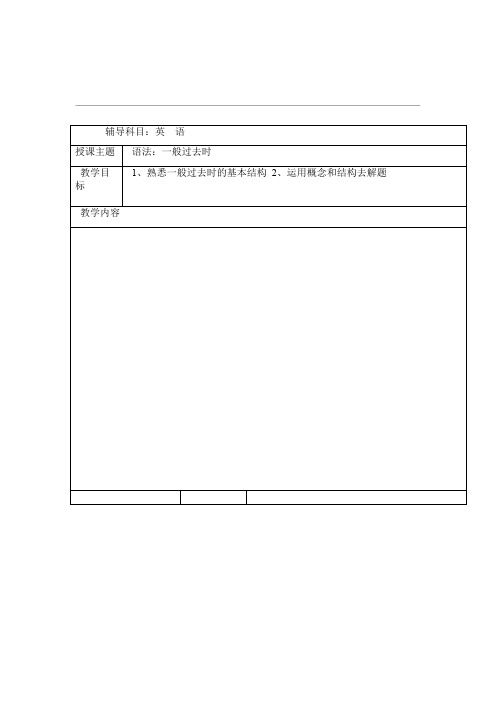
辅导科目:英语经典句型-How was your weekend?-Great,thanks.-What did you do last weekend?-I did my homework.Section A的时间。
“1. 表示发生在过去的动作”,要用一般过去时,句中常含表示“过去”一般过去时的结构:主语+V过去式。
翻译时加上“…了”。
“过去式”)复数单数(不管主语是“”还是“”,动词始终用(1) He _________ (go) to school on foot yesterday.练:(2) –What did Jim do?-- He _________ (go) to the movies.(3) We ___________ (not go) to the cinema last Sunday.) 引导,动词还原你上个周末做了什么?2. –-- What did you do last weekend? (did-- I played tennis on Sunday morning. --在星期天上午,我打了网球。
拓展:时间前的介词用什么1Tina's weekend? -- How was 3. –Tina的周末怎么样?. --它很棒:It was great–它还不错:It was not bad. 它很糟糕:It was terrible.–( ) 1--_____you busy last weekend?--Yes, I helped my mother clean the house and the garden.D Are C Did A Were B WasWhat did they do last weekend? ( ) 2–-- They _______in the park.D took boating C went boating B went to a boat A went a boat) 3-How many ____did you see on the farm? (D chicken C cow A sheeps B sheepDid you have a good weekend?( ) 4 –---Yes ,it was good. But I was kind of ______.D excited A interested B happy C tired) 5 Mary _____very late last night . (D put down A stayed up B sat down C woke upin the swimming pool yesterday. ) 6 Mike _____ (D swims A swimed B swimmed C swam( ) 7 There isn't ________ in the restaurant .2His mother made some dumplings yesterday. 用法1: ①过去某个时间发生的动作例:Jim was 12 years old.②过去某个时间存在的状态例:He often went to swim when he was a child. ③过去经常或反复发生的动作例:与一般过去时连用的时间状语常见的有:2.the day before yesterday , the Yesterday, last night, in 1990, once, two days ago,几天前other day3. 一般过去时的四个基本句型谓语动词是do谓语动词是beThey He was in the room yesterday. watched TV yesterday. 肯定句They in the room didn't watch TV yesterday.was not He 否定句yesterday.Was he in the room yesterday? Did they watch TV yesterday?一般疑问句Yes, he was. No, he wasn't. Yes, they did.No, they didn't.they do yesterday?What did he yesterday?Where was 特殊疑问句动词的过去式和过去分词的规则变化4.3练一练run come take are go have dobecomehope trip leave look live stop carrysaycome do get go want finish call areread take put see eat say巧记动词过去时态巧记动词过去时态动词一般过去时,表示过去发生的事;;变had或用be用waswere, have, has谓语动词过去式,过去时间坐标志;,若是特殊得硬记。
七年级下册一般过去时讲解及练习题(完整资料).doc
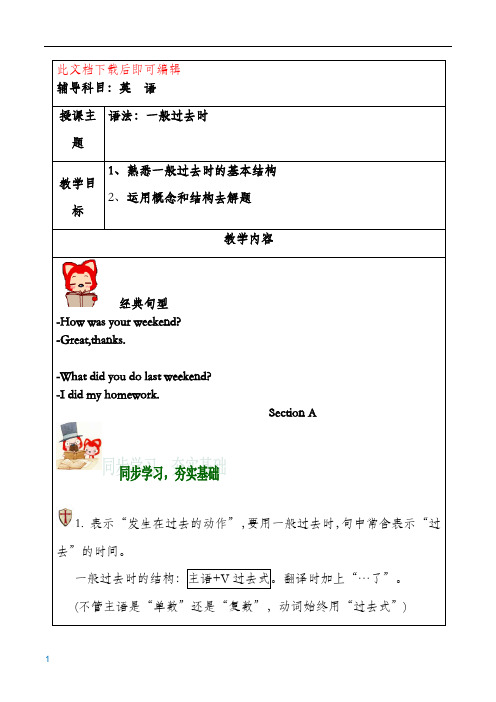
此文档下载后即可编辑辅导科目:英语授课主题语法:一般过去时教学目标1、熟悉一般过去时的基本结构2、运用概念和结构去解题教学内容经典句型-How was your weekend?-Great,thanks.-What did you do last weekend?-I did my homework.Section A1. 表示“发生在过去的动作”,要用一般过去时,句中常含表示“过去”的时间。
一般过去时的结构:主语+V过去式。
翻译时加上“…了”。
(不管主语是“单数”还是“复数”,动词始终用“过去式”)练:(1) He _________ (go) to school on foot yesterday.(2) – What did Jim do?-- He _________ (go) to the movies.(3) We ___________ (not go) to the cinema last Sunday.2. –你上个周末做了什么?-- What did you do last weekend? (did 引导,动词还原)--在星期天上午,我打了网球。
-- I played tennis on Sunday morning.拓展:时间前的介词用什么在上午/下午/晚上:in the morning/afternoon/evening在星期天上午/下午/晚上:on Sunday morning/afternoon/evening 在上个星期天上午:/ last Sunday morning (前不用冠词)在上学的白天/晚上:on school days/nightson weekends 在周末on weekdays 在工作日3. –Tina的周末怎么样?-- How was Tina’s weekend?--它很棒:It was great.–它还不错:It was not bad.–它很糟糕:It was terrible.。
七年级的的下册的的一般过去时讲解及练习题.docx
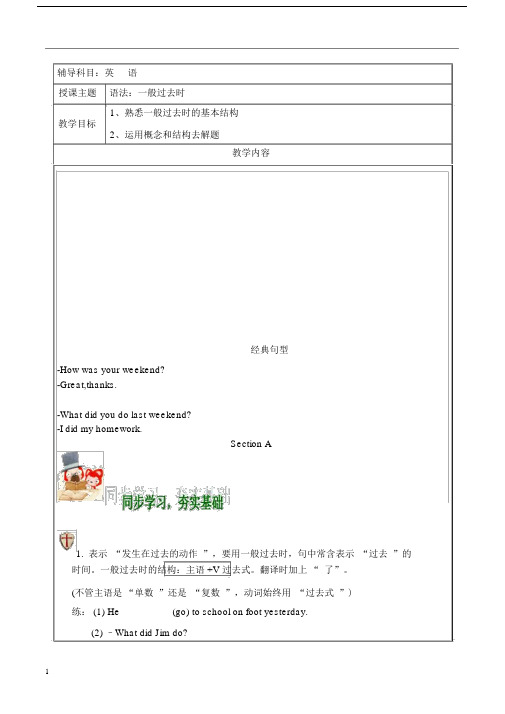
辅导科目:英语授课主题语法:一般过去时1、熟悉一般过去时的基本结构教学目标2、运用概念和结构去解题教学内容经典句型-How was your weekend?-Great,thanks.-What did you do last weekend?-I did my homework.Section A1.表示“发生在过去的动作”,要用一般过去时,句中常含表示“过去”的时间。
一般过去时的结构:主语 +V 过去式。
翻译时加上“ 了”。
(不管主语是“单数”还是“复数”,动词始终用“过去式”)练: (1) He _________ (go) to school on foot yesterday.(2) –What did Jim do?--He _________ (go) to the movies.(3)We ___________ (not go) to the cinema last Sunday.2. –你上个周末做了什么? -- What did you do last weekend? (did 引导,动词还原 ) --在星期天上午,我打了网球。
-- I played tennis on Sunday morning.拓展:时间前的介词用什么在上午 /下午 /晚上: in the morning/afternoon/evening在星期天上午 /下午 /晚上: on Sunday morning/afternoon/evening在上个星期天上午:/last Sunday morning (前不用冠词 )在上学的白天 /晚上: on school days/nightson weekends 在周末on weekdays 在工作日3.–Tina 的周末怎么样? -- How was Tina ’ s weekend?--它很棒: It was great .–它还不错: It was not bad.–它很糟糕: It was terrible.( ) 1--_____you busy last weekend?--Yes, I helped my mother clean the house and the garden.A WereB WasC DidD Are( ) 2–What did they do last weekend?-- They _______in the park.A went a boatB went to a boatC went boatingD took boating( ) 3-How many ____did you see on the farm?A sheepsB sheepC cowD chicken( ) 4 –Did you have a good weekend?---Yes ,it was good. But I was kind of ______.A interestedB happyC tiredD excited( ) 5 Mary _____very late last night .A stayed upB sat downC woke upD put down( ) 6 Mike _____in the swimming pool yesterday.A swimedB swimmedC swamD swims( ) 7 There isn’ t ________ in the restaurant .A something deliciousB anything deliciousC everything expensiveD nothing expensive( ) 8 The movie was ______ but ______.A interested ; scaredB interested ; scaryC interesting ; scaredD interesting ; scary( ) 9 Did you see the boy _____ soccer on the playground just now ?A playedB playsC playingD to play语法一般过去式1 用法 : ①过去某个时间发生的动作②过去某个时间存在的状态③过去经常或反复发生的动作例: His mother made some dumplings yesterday.例: Jim was 12 years old.例: He often went to swim when he was a child.2.与一般过去时连用的时间状语常见的有:Yesterday, last night, in 1990, once, two days ago, the day before yesterday , theother day 几天前3.一般过去时的四个基本句型谓语动词是 be谓语动词是 do肯定句He was in the room yesterday.They watched TV yesterday.否定句He was not in the room They didn ’ t watchTV yesterday.yesterday.一般疑问Was he in the room yesterday?Did they watch TV yesterday?句Yes, hewas. No, he wasn’ t.Yes, they did. No, they didn ’ t.特殊疑问Where was he yesterday?What did they do yesterday?句4. 动词的过去式和过去分词的规则变化①一般在动词词尾加ed例: want→ wanted②以 e 结尾的动词,只加d例: live→ lived③以辅音字母加y 结尾的动词,改y 为 i,再加 ed例: study→ studied④以重读闭音节结尾,末尾只有一个辅音字母,双写这一辅音字母,再加ed例: stop→stopped 5.不规则动词过去式:am,is--was,are--were, do--did,see--saw, say-said, give-gave,get-got,go-went,come-came,have-had,eat-ate,take-took,run-ran,sing-sang,put-put,fly-flew,make-made,read-read,write-wrote,draw-drew,drink-drank,ride-rode,speak-spoke,sweep-swept,swim-swam,sit-sat练一练are go have do come take runbecomesay leave look live stop carry hope trip call finish want are go do get come巧记动词过去时态动词一般过去时,表示过去发生的事;be用was或用 were, have, has变had;谓语动词过去式,过去时间坐标志;一般动词加 -ed ,若是特殊得硬记。
初中英语 语法 七年级下 一般过去时讲解 解析及过关练习题
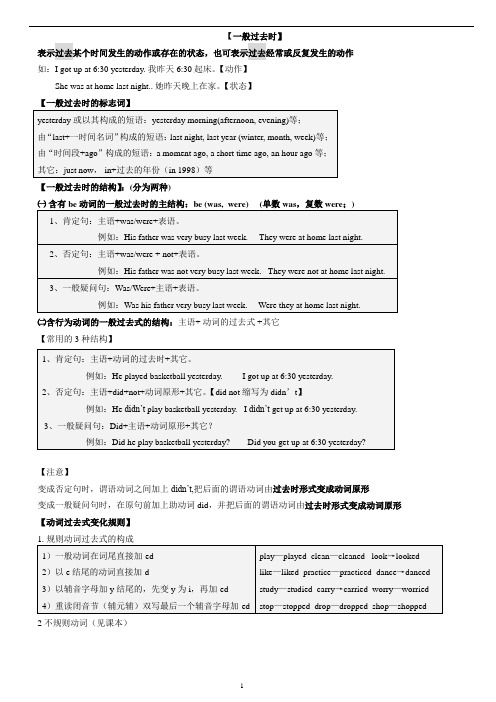
【一般过去时】表示过去某个时间发生的动作或存在的状态,也可表示过去经常或反复发生的动作如:I got up at 6:30 yesterday. 我昨天6:30起床。
【动作】She was at home last night.. 她昨天晚上在家。
【状态】【一般过去时的结构】:(分为两种)㈠含有be动词的一般过去时的主结构:be (was, were) (单数was,复数were;)㈡含行为动词的一般过去式的结构:主语+ 动词的过去式 +其它【常用的3种结构】【注意】变成否定句时,谓语动词之间加上didn’t,把后面的谓语动词由过去时形式变成动词原形变成一般疑问句时,在原句前加上助动词did,并把后面的谓语动词由过去时形式变成动词原形【动词过去式变化规则】2不规则动词(见课本)【练习】walk____ live_____ stop_____ study____ use _____ come ___ start___ worry_____ have_____ do_____ go_____tell____ see____ put____ make______ buy_____ play_____ hear_____ know_____ get_____ Lily was ten years old last year.否定句:_________________________________________一般疑问句: ______________________________They did their homework yesterday否定句:_________________________________________一般疑问句: ______________________________He went to the park last week.否定句:_________________________________________一般疑问句: ______________________________选择1.What _____they _____dinner yesterday?A. do; have forB. did; had forC. did; have forD. were; have for2.One of us ______band last month.A. leavesB. leaveC. leavedD. left3.Where _______your mother born?A. areB. wasC. wereD. is4.My mother ____________ some cakes for us last night.A. makesB. makedC. madeD.to make5.I got up _____this morning, so I _____breakfast and went to school.A. late; didn’t haveB. early; didn’t haveC. late; hadn’tD. early; hadn’t6.It ______much cold today than it _____ yesterday.A. is; isB. was; wasC. is; wasD. was; is7.He didn’t come _____goodbye to us and away.A. say; goB. say; wentC. to say; wentD. to say go8.Her pen was broken. She____ to _____a new one.A. wants; buysB. wanted; boughtC. wants; boughtD. wanted; buy9.I stayed in the sitting room and ____my friends all the time.A. talk toB. talkedC. talk aboutD. talked to10.—he go to Central Park? —Yes, he did.A. DidB. DoC. DoesD. Is11.The little girl often _______ there, last week, she _________ there, too.A. go, wentB. go, goesC. goes, goesD. goes, went。
七年级英语一般过去时讲解与练习
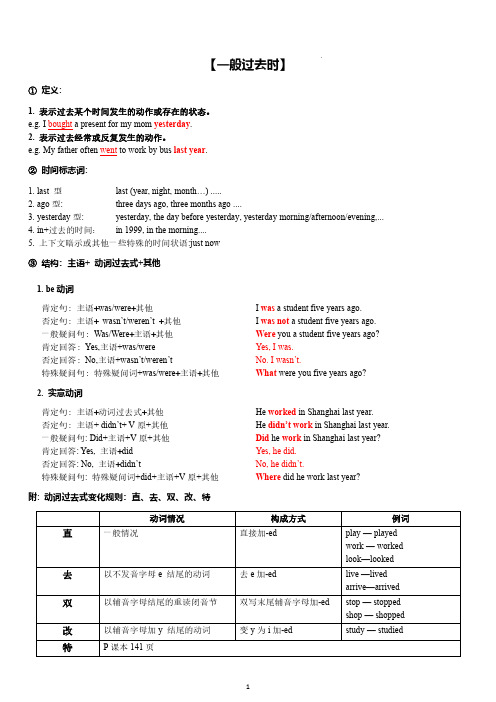
【一般过去时】①定义:1.表示过去某个时间发生的动作或存在的状态。
e.g.I bought a present for my mom yesterday.2.表示过去经常或反复发生的动作。
e.g.My father often went to work by bus last year.②时间标志词:st型last(year,night,month…).....2.ago型:three days ago,three months ago....3.yesterday型:yesterday,the day before yesterday,yesterday morning/afternoon/evening,...4.in+过去的时间:in1999,in the morning....5.上下文暗示或其他一些特殊的时间状语:just now③结构:主语+动词过去式+其他1.be动词肯定句:主语+was/were+其他I was a student five years ago.否定句:主语+wasn’t/weren’t+其他I was not a student five years ago.一般疑问句:Was/Were+主语+其他Were you a student five years ago?肯定回答:Yes,主语+was/were Yes,I was.否定回答:No,主语+wasn’t/weren’t No.I wasn’t.特殊疑问句:特殊疑问词+was/were+主语+其他What were you five years ago?2.实意动词肯定句:主语+动词过去式+其他He worked in Shanghai last year.否定句:主语+didn’t+V原+其他He didn’t work in Shanghai last year.一般疑问句:Did+主语+V原+其他Did he work in Shanghai last year?肯定回答:Yes,主语+did Yes,he did.否定回答:No,主语+didn’t No,he didn’t.特殊疑问句:特殊疑问词+did+主语+V原+其他Where did he work last year?附:动词过去式变化规则:直、去、双、改、特动词情况构成方式例词直一般情况直接加-ed play—playedwork—workedlook—looked 去以不发音字母e结尾的动词去e加-ed live—livedarrive—arrived 双以辅音字母结尾的重读闭音节双写末尾辅音字母加-ed stop—stoppedshop—shopped 改以辅音字母加y结尾的动词变y为i加-ed study—studied特P课本141页★即时即练I.写出下列动词的过去式和中文意思1.ride__________________2.feed__________________3.talk__________________4.do___________________5.grow__________________6.learn__________________7.pick__________________8.are__________________9.eat__________________ 10.study_________________11.see__________________12.take_________________ 13.buy__________________14.sleep_________________15.get__________________ 16.meet_________________17.watch_________________18.live__________________ 19.go________________20.dance________________21.write________________ II.句型转换1.Lucy did her homework at home.(改为否定句)Lucy________________her homework at home.2.His father worked all day last Monday.(改为一般疑问句)________his father________all day last Monday?3.I was very busy yesterday.(改为否定句)I________________very busy yesterday.4.There was some orange in the cup.()________there________orange in the cup?5.They went to the movies last Saturday.(对划线部分提问)________________they________last weekend?把下列句子改为否定句、一般疑问句并作肯定、否定回答1.My trip last weekend was excellent.2.The stars were so beautiful at night.3.The farmer showed Carol around the farm.4.We asked him some questions.III.用括号内所给单词的适当形式填空1.Mary and Tom________________(come)to China last month.2.Mike________________(not go)to bed until12o’clock,so he________________(get)up late.3.My cousin________________(read)English book in the living room now.4.I often________________(call)Mike in the morning.5.Tom________________(begin)to learn Chinese last year.6.She________________(visit)the country two years ago.7.The man________________(write)the book in2005.8.She________________(go)into the room because she________________(forget)her key9.I________________(wash)the clothes and________________(clean)the room.10.My mother________________(go)shopping yesterday.11.He________________(be)busy last Sunday,but you________________(be)free.IV.Grammar Focus1.—你学校的旅行怎么样?—太棒啦!________________________________________________________________________________________________? ________________________________________________________________________________________________!2.—你去过动物园了吗?—没有,我去了农场。
(完整)七年级英语一般过去时详细讲解与练习题学生版

(完整)七年级英语一般过去时详细讲解与练习题学生版1 一般过去时详细讲解与练习题(学生版)一、巧记一般过去时:动词一般过去时,表示过去发生的事;be 用was 或用were, have,has 变had ;谓语动词过去式,过去时间作标志;一般动词加-ed ,若是特殊得硬记。
否定句很简单,主语之后didn ’t添;疑问句也不难,did 放在主语前;不含be 动词时如果谓语之前有did ,谓语动词需还原;动词若是was, were,否定就把not 添。
含be 动词时疑问句也不难,要把was ,were 放在主语前。
二、be 的过去时有四巧:一是时间状语巧,表示过去的短语要记牢;二是形式巧,单数was ,复数were ;三巧是否定句结构,not 紧跟was /were ;四是疑问句式巧,was /were 向前跑(提前)。
【一巧】时间状语(即标志词)巧。
一般过去时表示过去发生的动作或存在的状态,恰巧与表示过去的一些时间状语连用。
【二巧】形式巧。
例如:I was in the classroom yesterday morning .昨天早上我在教室里。
They were over there a moment ago .刚才他们在那边。
【三巧】否定句结构巧。
与动词be 的一般现在时一样,它在动词后面加not 即可变成否定句,并且was, were 与not 可以缩写成wasn't, weren't 。
即:主语+wasn't /weren't +表语+其他。
例如:I was not (=wasn't) here yesterday .昨天我不在这儿。
My parents were not (=weren't) at home last Sunday .【四巧】疑问句式巧。
把was, were 提到句首,句末用问号即可变为一般疑问句。
即:Was(Were) +主语+表语+其他?例如:Were you at home the day before yesterday ﹖前天你在家吗?肯定回答用“Yes, 主语+was /were .”Yes, I was.否定回答用“No,主语+wasn't /weren't .”No, I wasn ’t.1. yesterday 或以其构成的短语:yesterday morning(afternoon, evening)等;2. 由“last+一时间名词”构成的短语:last night, last year (winter, month,week)等;3. 由“时间段+ago ”构成的短语:a moment ago, a short time ago, an hour ago等;。
(word完整版)七年级英语一般过去时详细讲解与练习题人教版
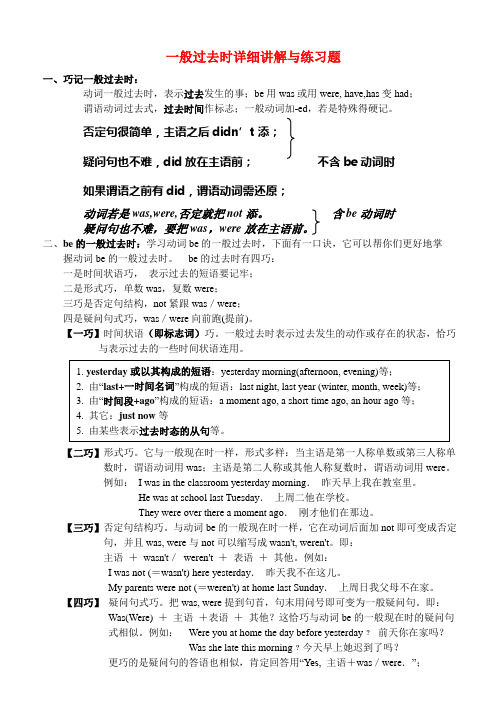
一般过去时详细讲解与练习题一、巧记一般过去时:动词一般过去时,表示过去发生的事;be 用was 或用were, have,has 变had ;谓语动词过去式,过去时间作标志;一般动词加-ed ,若是特殊得硬记。
否定句很简单,主语之后didn ’t 添; 疑问句也不难,did 放在主语前; 不含be 动词时如果谓语之前有did ,谓语动词需还原;动词若是was,were,否定就把not 添。
含be 动词时疑问句也不难,要把was ,were 放在主语前。
二、be 的一般过去时:学习动词be 的一般过去时,下面有一口诀,它可以帮你们更好地掌 握动词be 的一般过去时。
be 的过去时有四巧:一是时间状语巧, 表示过去的短语要记牢;二是形式巧,单数was ,复数were ;三巧是否定句结构,not 紧跟was /were ;四是疑问句式巧,was /were 向前跑(提前)。
【一巧】时间状语(即标志词)巧。
一般过去时表示过去发生的动作或存在的状态,恰巧 与表示过去的一些时间状语连用。
【二巧】形式巧。
它与一般现在时一样,形式多样:当主语是第一人称单数或第三人称单 数时,谓语动词用was ;主语是第二人称或其他人称复数时,谓语动词用were 。
例如: I was in the classroom yesterday morning . 昨天早上我在教室里。
He was at school last Tuesday . 上周二他在学校。
They were over there a moment ago . 刚才他们在那边。
【三巧】否定句结构巧。
与动词be 的一般现在时一样,它在动词后面加not 即可变成否定 句,并且was, were 与not 可以缩写成wasn't, weren't 。
即:主语 + wasn't / weren't + 表语 + 其他。
例如:I was not (=wasn't) here yesterday . 昨天我不在这儿。
初一下一般过去时讲解及训练
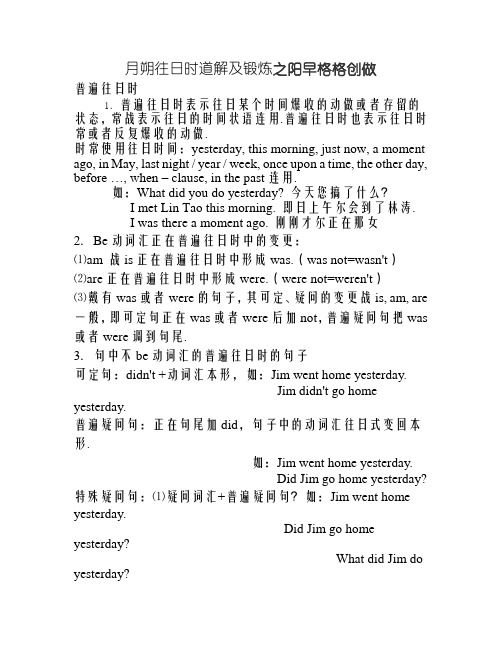
月朔往日时道解及锻炼之阳早格格创做普遍往日时1.普遍往日时表示往日某个时间爆收的动做或者存留的状态,常战表示往日的时间状语连用.普遍往日时也表示往日时常或者反复爆收的动做.时常使用往日时间:yesterday, this morning, just now, a moment ago, in May, last night / year / week, once upon a time, the other day, before …, when – clause, in the past连用.如:What did you do yesterday? 今天您搞了什么?I met Lin Tao this morning. 即日上午尔会到了林涛.I was there a moment ago. 刚刚才尔正在那女2.Be动词汇正在普遍往日时中的变更:⑴am 战is正在普遍往日时中形成was.(was not=wasn't)⑵are正在普遍往日时中形成were.(were not=weren't)⑶戴有was或者were的句子,其可定、疑问的变更战is, am, are 一般,即可定句正在was或者were后加not,普遍疑问句把was 或者were调到句尾.3.句中不be动词汇的普遍往日时的句子可定句:didn't +动词汇本形,如:Jim went home yesterday.Jim didn't go home yesterday.普遍疑问句:正在句尾加did,句子中的动词汇往日式变回本形.如:Jim went home yesterday.Did Jim go home yesterday?特殊疑问句:⑴疑问词汇+普遍疑问句?如:Jim went home yesterday.Did Jim go home yesterday?What did Jim do yesterday?动词汇往日式变更准则:(1) 普遍正在动词汇后加-ed.如:play—played, offer—offered, weigh—weighed, destroy— destroyed, sign—signed.(2) 正在以字母e末端的动词汇后,只加-d.如:like—liked, provide—provided, hate — hated, date—dated.(3) 正在以“辅音字母+y”末端的动词汇后,则改y为i,再加—ed.如:supply—supplied, fly—flied, study— studied.(4) 正在以单短元音的沉读关音节末端且,开端惟有一个辅音字母的动词汇后,单写开端一个辅音字母,再加-ed.如:plan—planned, refer—referred, regret—regretted, ban—banned. 不准则动词汇往日式归纳:普遍往日时锻炼题一、单项采用:从下列各题后所给的四个选项中采用最好问案挖空.( )1.My father______ill yesterday.A.isn't B.aren't C.wasn't D.weren't( )2 ______your parents at home last week﹖A.Is B.Was C.Are D.Were( )3.The twins______in Dalian last year.They______here now.A.are; were B.were; are C.was; are D.were; was ( )4.______your father at work the day before yesterday (前天)﹖A.Was B.Is C.Was D.Is( )5.—Who was on duty last Friday﹖—______.A.I am B.I was C.Yes, I was D.No, I wasn't两、请用精确动词汇形式挖空.1. I _________ (have) an exciting party last weekend.2. ---_________ she _________(practice) her guitar yesterday?---No, she _________.3. ---What ________ Tom ________ (do) on Saturday evening?---He ________(watch) TV and __________(read) an interesting book.4. They all _________(go) to the mountains yesterday morning.5. She _________(not visit) her aunt last weekend.She ________ (stay) at home and _________(do) some cleaning.三、翻译下列句子1. 尔过了一个闲碌但是却刺激的周终.I _________ _________ __________ __________ exciting weekend.2. Jenny喜欢瞅书籍.昨早她瞅了一本英语书籍.Jenny likes _________ __________. She _________ an English book last night.3. Emma每天皆瞅电视.但是今天他不瞅.Emma__________ TV every day. But he _________ ________ ________ yesterday.4. 上周六他们搞什么了?他们制做业战买物了.What ________ they _________ _________ Saturday?They _________ __________ homework and _________ __________.5. 即日早上圆圆得搞饭,果为他女亲不正在家.This morning Fangfang ____ ____ ____ ____ because his father _____ _________ yesterday.四、改写句子:1、Lucy did her homework at home.(改可定句)Lucy ________ _______ her homework at home.2、He found some meat in the fridge(冰箱).(变普遍疑问句)___________ he __________ ___________ meat in the fridge?3、There was some orange in the cup.(变普遍疑问句)_______ there _______ orange in the cup?4. Frank read an interesting book about history. (普遍疑问句)_______ Frank _______ an interesting book about history?5. Why not go out for a walk? (共义句)_______ ________ ________ out for a walk?五、改错题1.How is Jane yesterday? _____________________2.He go to school by bus last week. ____________________________3.He often goes home at 6:00 last month. ____________________________4.I can fly kites seven years ago. ______________________________5.Did you saw him just now. ____________________________________六、完形挖空Tom did not like doing his homework,because he liked to do some1things after school.And his teacher always 2a lot of mistakes in his homework.Then one day,his math teacher3 at Tom’s homework and saw that he got all his answers right.He was very 4 and surprised(惊疑).The next morning before class,he called Tom 5 his desk and 6 to him,“You got all your homework right this time.Did your father help you?”Sometimes Tom’s father helped him with his homework,7 this time he didn’t help Tom because he 8 at home.So Tom answered,“NO,Sir.He Was busy last night,so I9 to do it 10 .”()1.A.others ()2.A.made ()3.A.laughed ()4.A.please ()5.A.to()6.A.talked ()7.A.and ()8.A.isn’t ()9.A.wanted ()10.A.itself B.anotherB.foundB.knockedB.pleasedB.forB.askedB.butB.won’t beB.mustn’tB.of themC.the otherC.looked atC.lookedC.pleasureC.inC.spokeC.soC.wasn’tC.likedC.myselfD.otherD.lookedD.sawD.sadD.atD.saidD.orD.can’t beD.haveD.himself。
2018初一下一般过去时讲解及训练
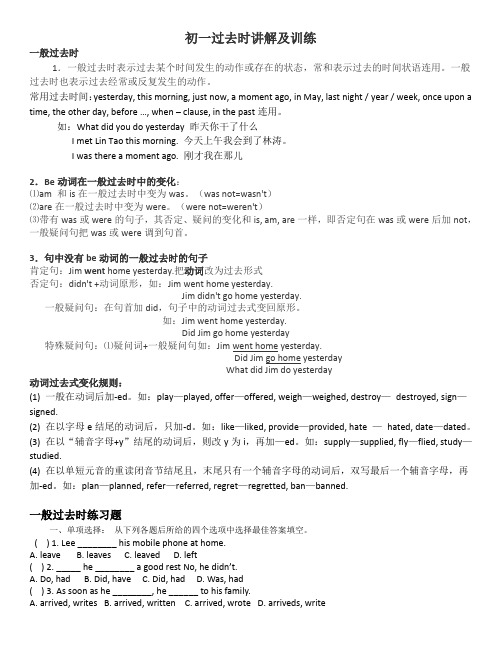
初一过去时讲解及训练一般过去时1.一般过去时表示过去某个时间发生的动作或存在的状态,常和表示过去的时间状语连用。
一般过去时也表示过去经常或反复发生的动作。
常用过去时间:yesterday, this morning, just now, a moment ago, in May, last night / year / week, once upon a time, the other day, before …, when – clause, in the past连用。
如:What did you do yesterday 昨天你干了什么I met Lin Tao this morning. 今天上午我会到了林涛。
I was there a moment ago. 刚才我在那儿2.Be动词在一般过去时中的变化:⑴am 和is在一般过去时中变为was。
(was not=wasn't)⑵are在一般过去时中变为were。
(were not=weren't)⑶带有was或were的句子,其否定、疑问的变化和is, am, are一样,即否定句在was或were后加not,一般疑问句把was或were调到句首。
3.句中没有be动词的一般过去时的句子肯定句:Jim went home yesterday.把动词改为过去形式否定句:didn't +动词原形,如:Jim went home yesterday.Jim didn't go home yesterday.一般疑问句:在句首加did,句子中的动词过去式变回原形。
如:Jim went home yesterday.Did Jim go home yesterday特殊疑问句:⑴疑问词+一般疑问句如:Jim went home yesterday.Did Jim go home yesterdayWhat did Jim do yesterday动词过去式变化规则:(1) 一般在动词后加-ed。
2018春七年级英语下册Module7Mypastlife一般过去时(1)语法要点(新版)外研版
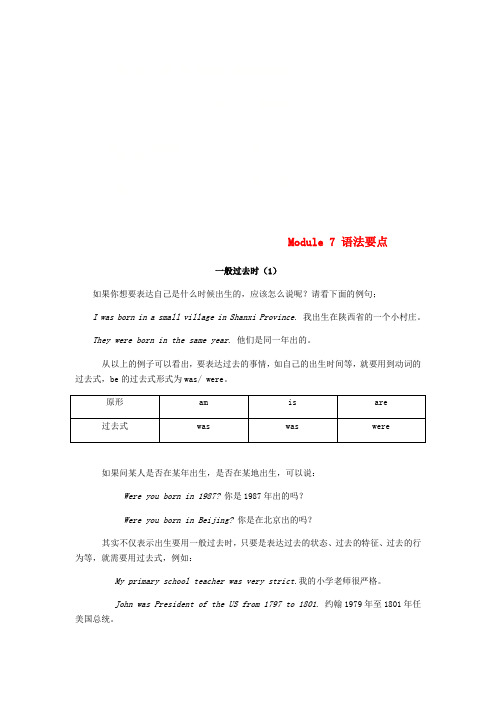
Module 7 语法要点一般过去时(1)如果你想要表达自己是什么时候出生的,应该怎么说呢?请看下面的例句;I was born in a small village in Shanxi Province. 我出生在陕西省的一个小村庄。
They were born in the same year. 他们是同一年出的。
从以上的例子可以看出,要表达过去的事情,如自己的出生时间等,就要用到动词的过去式,be的过去式形式为was/ were。
原形am is are过去式was was were如果问某人是否在某年出生,是否在某地出生,可以说:Were you born in 1987?你是1987年出的吗?Were you born in Beijing?你是在北京出的吗?其实不仅表示出生要用一般过去时,只要是表达过去的状态、过去的特征、过去的行为等,就需要用过去式,例如:My primary school teacher was very strict.我的小学老师很严格。
John was President of the US from 1797 to 1801. 约翰1979年至1801年任美国总统。
很多一般过去时的句子包含了表示过去的时间状语,如上面出现的from 1797 to 1801。
由谓语动词be构成的一般过去时的肯定、否定、疑问和回答句式如下;一.用“be” 的适当形式填空。
1.Lily, my sister, ________ (be)five last year.2.Tony ________ (be)born in America, he was born in Shanghai.3. _________ (be)it cold in your city yesterday?4.My parents ________ (be)born in 1915.5. It ________(be)hot yesterday and most children _______(be)outside.二.翻译句子。
- 1、下载文档前请自行甄别文档内容的完整性,平台不提供额外的编辑、内容补充、找答案等附加服务。
- 2、"仅部分预览"的文档,不可在线预览部分如存在完整性等问题,可反馈申请退款(可完整预览的文档不适用该条件!)。
- 3、如文档侵犯您的权益,请联系客服反馈,我们会尽快为您处理(人工客服工作时间:9:00-18:30)。
初一过去时讲解及训练一般过去时1.一般过去时表示过去某个时间发生的动作或存在的状态,常和表示过去的时间状语连用。
一般过去时也表示过去经常或反复发生的动作。
常用过去时间:yesterday, this morning, just now, a moment ago, in May, last night / year / week, once upon a time, the other day, before …, when – clause, in the past连用。
如:What did you do yesterday? 昨天你干了什么?I met Lin Tao this morning. 今天上午我会到了林涛。
I was there a moment ago. 刚才我在那儿2.Be动词在一般过去时中的变化:⑴am 和is在一般过去时中变为was。
(was not=wasn't)⑵are在一般过去时中变为were。
(were not=weren't)⑶带有was或were的句子,其否定、疑问的变化和is, am, are 一样,即否定句在was或were后加not,一般疑问句把was或were调到句首。
3.句中没有be动词的一般过去时的句子肯定句:Jim went home yesterday.把动词改为过去形式否定句:didn't +动词原形,如:Jim went home yesterday.Jim didn't go home yesterday.一般疑问句:在句首加did,句子中的动词过去式变回原形。
如:Jim went home yesterday.Did Jim go home yesterday?特殊疑问句:⑴疑问词+一般疑问句?如:Jim went home yesterday.Did Jim gohome yesterday?What did Jim do yesterday?动词过去式变化规则:(1) 一般在动词后加-ed。
如:play—played, offer—offered, weigh—weighed, destroy— destroyed, sign—signed.(2) 在以字母e结尾的动词后,只加-d。
如:like—liked, provide—provided, hate — hated, date—dated。
(3) 在以“辅音字母+y”结尾的动词后,则改y为i,再加—ed。
如:supply—supplied, fly—flied, study— studied.(4) 在以单短元音的重读闭音节结尾且,末尾只有一个辅音字母的动词后,双写最后一个辅音字母,再加-ed。
如:plan—planned, refer—referred, regret—regretted, ban—banned.一般过去时练习题1、单项选择:从下列各题后所给的四个选项中选择最佳答案填空。
( ) 1. Lee ________ his mobile phone at home.A. leaveB. leavesC. leavedD. left( ) 2. _____ he ________ a good rest? No, he didn’t.A. Do, hadB. Did, haveC. Did, hadD. Was, had( ) 3. As soon as he ________, he ______ to his family.A. arrived, writesB. arrived, writtenC. arrived, wroteD. arriveds, write ( ) 4. Mr. Black was late because he _______ his way.A. lostedB. loseC. losesD. lost( ) 5. When _________ Lee ________ school this morning?A. did, got toB. did, get toC. did, getD. did, got( ) 6. Will you please say it again? I ________ quite _______ you.A. didn’t, hearB. don’t, heardC. didn’t, heardD. don’t, hear( ) 7. ______ you ________ at six o’clock yesterday?A. Do ,get upB. Did, get upC. Do, got upD. Did, got up( ) 8.What did you see _________?A. nowB. every dayC. these daysD. just now( ) 9.He went into the room and _______ the door.A. lockB. lockingC. locksD. locked( ) 10. —What _____ you _______ last week? —I bought a bag.A. did ,buyB. did , boughtC. do, buyD. do, bought( ) 11. —_____ he ____ his lunch? — Yes, he did.A. Does ,hasB. Does, haveC. Did, haveD. Did, had( ) 12. -When did May come back from Jinan? -She __ from Jinan last Friday.A. come backB. comes backC. returned backD. came back( ) 13. ____ she _____ this dictionary in the bookshop nearby last week? A. Did, buy B. Does, buy C. Did, bought D. Does, buys( ) 14. Where _____ Uncle Sun yesterday? A. was B. were C. did D. does ( ) 15. There _____ a telephone call for my brother Steven yesterday?A. isB. areC. wasD. were( ) 16. Liu Fengwei _____ three yuan for the lost library book.A. paidB. payC. spentD. lost( ) 17. He ____ in this school in 1958.A. taughtB. teachC. teachesD. teaching( ) 18. They _____ tired so they stopped ____ a rest.A. are, haveB. were, haveC. were, to haveD. are, having( ) 19. She said her brother ____ in Beijing. He ______ to Japan on business l week.A. wasn’t, wentB. hasn’t, wentC. wasn’t, goD. isn’t, went二、请用正确动词形式填空。
1. I _________ (have) an exciting party last weekend.2. ---_________ she _________(practice) her guitar yesterday?---No, she _________.3. ---What ________ Tom ________ (do) on Saturday evening?---He ________(watch) TV and __________(read) an interesting book.4. They all _________(go) to the mountains yesterday morning.5. She _________(not visit) her aunt last weekend.She ________ (stay) at home and _________(do) some cleaning.句型转换1、 The children had a good time in the park.否定句:__________________________________________一般疑问句:________________________________________ 对划线部分提问:______________________________________ 2、 There were about nine hundred people at the concert.(音乐会)否定句:__________________________________________一般疑问句:________________________________________ 对划线部分提问:______________________________________ 3、 There was only one problem.否定句:__________________________________________一般疑问句:________________________________________ 肯定/否定回答:____________________________________对划线部分提问:___________________________________ 4、 Ann did her homework yesterday evening.否定句:__________________________________________一般疑问句:________________________________________ 对划线部分提问:______________________________________ 5、 Last week I read an English book.否定句:__________________________________________一般疑问句:________________________________________ 肯定/否定回答:____________________________________ 五、改错题1.How is Jane yesterday? _____________________2.He go to school by bus last week.____________________________3.He often goes home at 6:00 last month. ____________________________4.I can fly kites seven years ago. ______________________________5.Did you saw him just now. ____________________________________六、完形填空Tom did not like doing his homework,because he liked to do some 1 things after school.And his teacher always 2 a lot of mistakes in his homework.Then one day,his math teacher 3 at Tom’s homework and saw that he got all his answers right.He was very 4 and surprised(惊奇).The next morning before class,he called Tom 5 his desk and 6 to him,“You got all your homework right this time.Did your father help you?”Sometimes Tom’s father helped him with his homework, 7 this time he didn’t help Tom because he 8 at home.So Tom answered,“NO,Sir.He Was busy last night,so I 9 to do it 10 .”()1.A.others()2.A.made()3.A.laughed()4.A.please()5.A.to ()6.A.talked()7.A.and ()8.A.isn’t()9.A.wanted B.anotherB.foundB.knockedB.pleasedB.forB.askedB.butB.won’tbeB.mustn’tB.ofthemC.the otherC.looked atC.lookedC.pleasureC.inC.spokeC.soC.wasn’tC.likedC.myselfD.otherD.lookedD.sawD.sadD.atD.saidD.orD.can’t beD.haveD.himself()10.A.itselfUnit 7 Topic 3第一部分听力(20分)Ⅰ. 听句子,选择正确图片。
